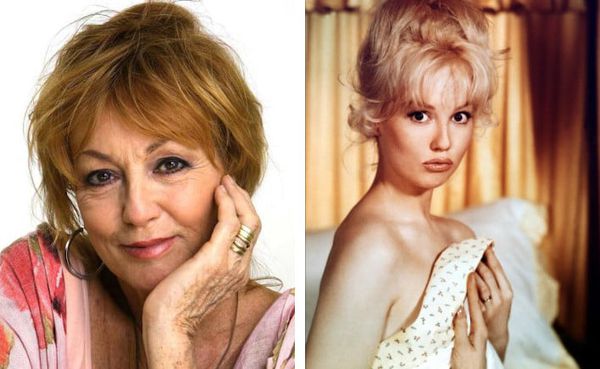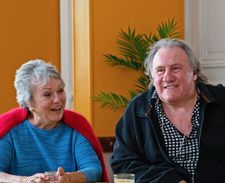 |
| Mylène Demongeot in recent years and in the British comedy Upstairs, Downstairs made in 1959 and directed by Ralph Thomas Photo: UniFrance |
Demongeot who spent her youth in Montpellier and adored the region around the town, latterly had devoted herself to animal rights in common with her contemporary Brigitte Bardot. Bardot wrote in one of her books that "Mylène was my little cinema sister, then became my combat sister, a libra like me, she has always loved animals”.
After the death of her long-standing companion Didier Raoult, the actress had her own battles with cancer and recently coronavirus against which she had declined to be vaccinated, claiming to have multiple allergies.
 |
| One of Mylène Demongeot’s last screen appearances with Gérard Depardieu in Retirement Home Photo: UniFrance |
The daughter of a French father and Ukrainian mother the actress made an early impression in Raymond Rouleau’s production of The Witches Of Salem alongside Simone Signoret and Yves Montand.
She was taken up and promoted by photographer Henri Coste with whom she learned to pose for the camera and who later became her first husband.
Demongeot was born in Nice in 1935 and appeared in more than 72 films in a career which spanned six decades. She was nominated for a Bafta award as most promising newcomer in 1957 for a Franco-German production of The Crucible, and was praised by the play’s author Arthur Miller as “bursting with real sexuality”.
She performed in such costume adventures as The Vengeance Of The Three Musketeers (1961) as Milady de Winter and in comedies, among them Fantômas (1964), directed by André Hunebelle, and its various sequels.
On the international arena notably she co-starred with David Niven in Otto Preminger’s Bonjour Tristesse from the novel by Françoise Sagan (1958). In the UK she co-starred in several comedies, including It's A Wonderful World (1956); Upstairs and Downstairs (1959) and Doctor in Distress (1963).
 |
| A late career hit: Mylène Demongeot with Claude Brasseur in Camping 3 Photo: UniFrance |
Another of the great loves of her life was Marc Simenon, the son of Maigret creator Georges Simenon with whom she had a tempestuous relationship.
In her later years she was conned out of her life-savings of some two million euros after a financial scare and only had survived by making drastic economies and living in a small flat in Paris. The anti-corruption squad eventually caught the culprit who intended using her money to make loans to the likes of Isabelle Adjani.





















